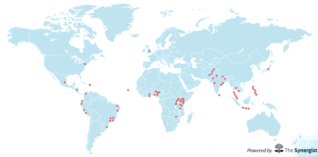- by Alison
Community projects add vaccine to anti-dengue arsenal
Break Dengue Community Action Prize results – One prize, two awards
In 2016 Break Dengue launched the Community Action Prize – a competition which rewards the best grassroots initiatives that combat dengue in an innovative way while integrating dengue vaccines as part of a holistic plan.
67 submissions from NGOs, healthcare professionals, vector control specialists and active community members entered the competition. Participants proposed ideas on how to educate communities on the dengue risk, help implement prevention measures and address community-level drivers and barriers for dengue vaccine integration.

Out of the 67 submissions, 15 finalists were selected and sent to the jury for deliberation. You can find the full list at the end of the article.
After careful analysis, we are excited to announce the winning initiative – Integrate vaccine aspects in “Implementing integrated vector management for dengue control”. This project is based in Phnom Penh, Cambodia and the jury was impressed by the initiative’s strategy to integrate a dengue vaccine within a proven, established platform initially focused on vector control. The results were unveiled today, at the ISNTD festival in London.
How will the initiative help combat dengue?
The project has an integrated approach to fighting dengue. It will first be implemented in the province of Kampong Cham, an area which suffers one of the highest dengue incidence rates in Cambodia. The initiative will be further implemented at the national level, through sustained efforts for governmental collaboration.
The Break Dengue Community Action Prize will allow the winning team to make a real difference in the fight against dengue by building on a successful vector control platform to establish a robust vaccine integration program at the community level. This will help to raise vaccine awareness with the support of Community Health Workers and the implementation of a COMBI (Communication for Behavioral Impact) program. In this way health educational messages are being developed with community members’ input (to ensure cultural resonance) and disseminated via a tuk-tuk driving through villages. These efforts will be scaled to the national level by leveraging the initiative’s strong relationship with the Cambodian Ministry of Health as it revises its National Dengue Strategic Plan for 2017-2020 to integrate dengue vaccines.
The jury recognized the scalability and potential for impact of this initiative’s integrated methodology. The submitting team’s strong presence at the ground level and a collaborative approach with the Cambodian Ministry of Health leaves it well positioned for success.
Special award for a systematic approach to vaccine integration
Break Dengue wishes to reward another initiative which submitted a strong scientific methodology for analyzing the vaccine integration options in the overall Colombian strategy to fight dengue.
The initiative – “Evaluation of Introduction of Dengue Vaccine in Colombia” – submitted by the George Washington University in USA, proposes surveying patients, practitioners, and public health officials to evaluate the feasibility and acceptability of introducing a dengue vaccine into Colombia.
The initiators plan to focus on elements vital for dengue vaccine dissemination such as: evaluation of budget for dengue vaccination nationwide, capacity for immunization monitoring, capacity for cold chain and logistics, vaccine demand, and vaccine acceptability.
These are the first steps in developing a systematic, science-based approach to dengue vaccine implementation. The jury views this to be an initiative of the highest distinction which has the potential to complement strategies to build an integrated approach to dengue control around the world.
Ambitious targets – now what?
The Break Dengue team will not only support the winning initiatives, but it commits to supporting the finalists through various activities – from editorial coverage to looking at how they can be included in the constantly-growing Break Dengue ecosystem.
Acknowledgments
We would like to congratulate all the 67 applicants, as well as the 15 finalists of the competition:

